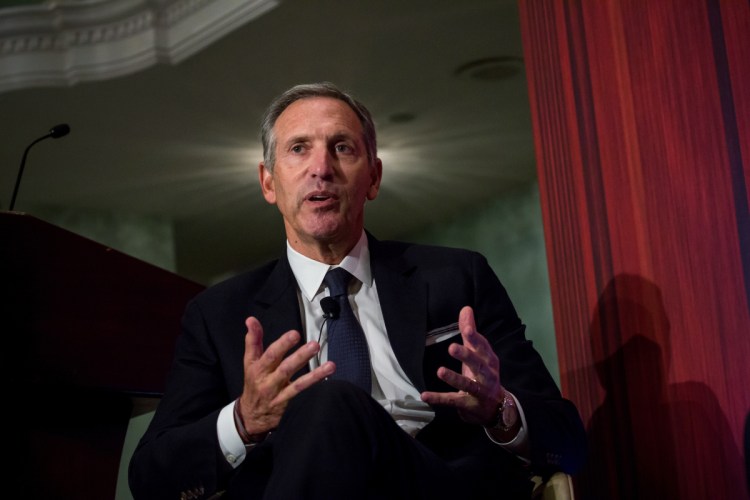Advisers to former Starbucks CEO Howard Schultz have been exploring the possibility of launching an independent bid for the White House in 2020, according to two people who have been informed of the discussions.
The entry of a high-profile billionaire Democrat outside the traditional party structure would add an unpredictable dynamic to the increasingly sprawling campaign to deny President Trump a second term.
Trump’s opponents, including many Democratic strategists, have expressed concerns that a serious three-way race in November would divide the Democratic vote in a way that helps Trump win reelection, either directly by denying Democrats states they would otherwise have won or by shifting the ultimate decision to the U.S. House.
Former Ohio governor John Kasich, a 2016 Republican candidate for president, is also looking at the possibility of running as an independent candidate. Neither Kasich nor Schultz have settled on a decision.
“Anyone thinking of running for president as an independent would have to think really hard about splitting the anti-incumbent, anti-Trump vote, and just playing the spoiler role and reelecting Trump,” said Howard Wolfson, a former strategist for Hillary Clinton’s 2008 presidential campaign. He now advises former New York Mayor Michael Bloomberg, who is considering his own presidential campaign, as a Democrat.
“I think that would be a terrible legacy for anyone to leave,” Wolfson said.
Washington State Democratic Party Chair Tina Podlodowski issued a statement Friday calling on Schultz to give up any consideration of an independent run.”I have two words for Howard Schultz on a potential run for president as an independent: Just. Don’t,” she said in a statement. “Too much is at stake to make this about the ambitions of any one person.”
Schultz, who has a net worth of about $3.3 billion and describes himself as a “lifelong Democrat,” has not said publicly whether he will mount a presidential campaign and has kept open the option of running as a Democrat. He will begin a national book tour on Jan. 28 for a memoir that describes his personal journey “to reimagine the promise of America.”
Schultz’s personal office did not respond Friday to a request for comment.
In all but two U.S. elections, candidates have won the presidency by earning a majority of Electoral College votes.
But the entry of a credible independent candidate could scramble those calculations by denying anyone an outright victory.
If no candidate wins 270 or more votes, the victor would be decided by the House in a “contingent election,” with each state delegation getting one ballot. The Senate would decide who becomes vice president. Such outcomes are historically rare, the last occurring in 1824, when the House resolved a four-way race in favor of John Quincy Adams, even though Andrew Jackson had received the most votes.
Although Democrats make up a majority of the House, Republicans still have an advantage in the number of state delegations they control, with more Republican members than Democrats in 26 of the 50 states. Democrats are a majority of 22 House delegations. Two states, Pennsylvania and Michigan, have an equal number of Republican and Democratic members.
Calculations like this led Bloomberg, another billionaire, to decide against mounting an independent bid for the presidency in 2016. After an extensive research effort, he concluded that his candidacy could win enough electoral votes to push the decision to the House, but not enough to win a majority of the Electoral College.
At the time, Republicans controlled a majority of seats in the House and the Senate. “The fact is, even if I were to receive the most popular votes and the most electoral votes, victory would be highly unlikely, because most members of Congress would vote for their party’s nominee,” Bloomberg declared in a 2016 article explaining his decision to stand down. He later endorsed Clinton.
Advisers to Kasich, a Republican critic of Trump, have been planning a 2020 run along parallel tracks, with separate blueprints for running as an independent and as a Republican in a primary challenge to Trump.
“I think for the first time, there is a legitimate chance for a third-party candidate,” Kasich said in a November interview on ABC’s “The View.”
“If you have the Republicans on the extreme and the Democrats on the extreme, there is a big wide-open space in the middle.”
Kasich strategist John Weaver said the former Ohio governor will take into account the risk of inadvertently helping Trump’s campaign before making a decision.
“Nobody would want to be a part of an effort that reelects Trump,” Weaver said.
Upon his retirement last summer, Schultz said he would focus on public service, leaving open the option of a presidential run. “Let’s just see what happens,” he told CNBC in June.
He has spoken in his deliberations with a network of former Starbucks advisers and board members, including former New Jersey Sen. Bill Bradley and Steve Schmidt, the former campaign manager for John McCain’s 2008 presidential run.
Copy the Story LinkSend questions/comments to the editors.



Success. Please wait for the page to reload. If the page does not reload within 5 seconds, please refresh the page.
Enter your email and password to access comments.
Hi, to comment on stories you must . This profile is in addition to your subscription and website login.
Already have a commenting profile? .
Invalid username/password.
Please check your email to confirm and complete your registration.
Only subscribers are eligible to post comments. Please subscribe or login first for digital access. Here’s why.
Use the form below to reset your password. When you've submitted your account email, we will send an email with a reset code.